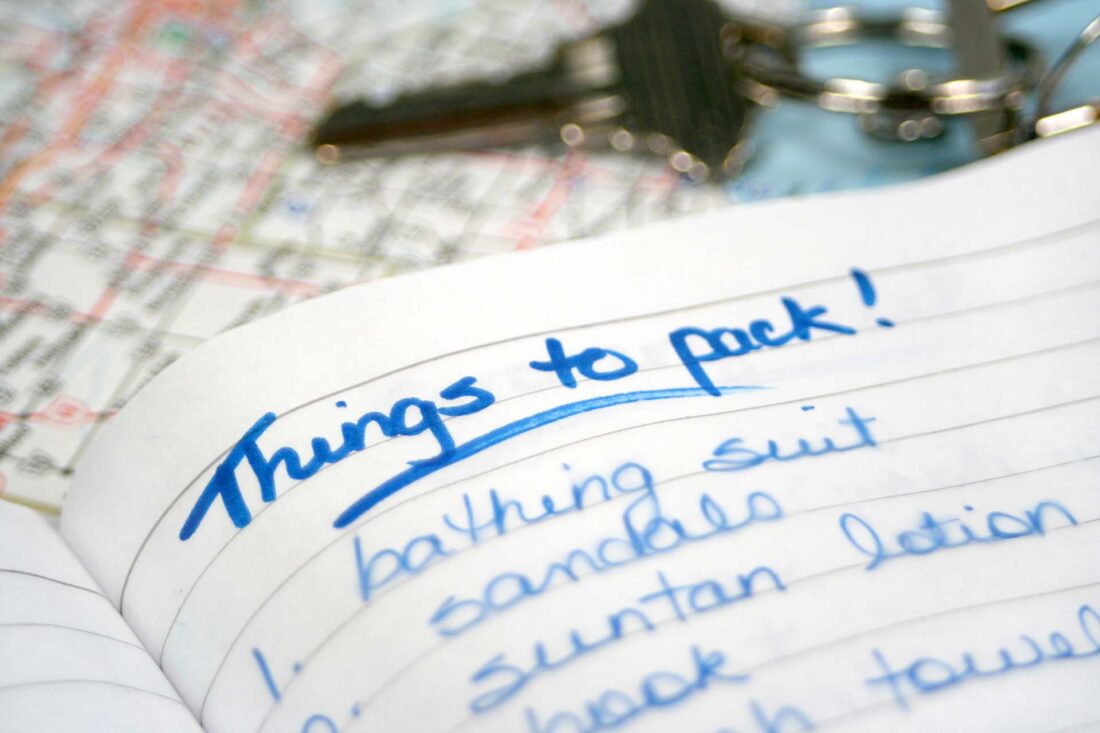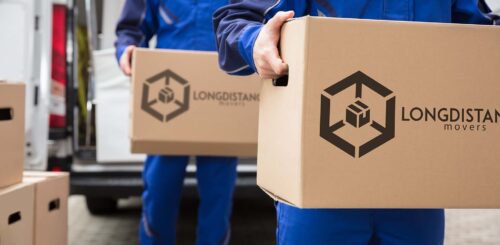Are you planning to relocate cross country soon? Then this ultimate checklist for moving to a new state is just what you need. Moving to a different part of the country is never an easy task. There is so much to think about, like looking for a house or apartment, finding a job, making friends, shipping your car, and the moving process itself. We hope that these tips and tricks will make the whole thing at least a little easier for you.


The First Item on Your Checklist for Moving to a New State – Research the New Location
Preparing for a state-to-state move requires thorough knowledge of your future home. This goes beyond its history and culture, focusing on aspects that directly affect your daily life. Here are crucial considerations for a seamless transition:
- Climate Considerations – Assess how the weather in your new state compares to your current location.
- Legal Differences – Familiarize yourself with any state-specific laws and regulations.
- Job Market Insights – Research the employment landscape in your new state.
- Cost of Living Analysis – Evaluate how the cost of living in your new state compares to your current one.
Gather tips, conduct thorough research, and develop a new state relocation plan. Utilize resources like a state-to-state moving guide and an interstate moving checklist to ensure you’re well-prepared. Remember, the more informed you are, the smoother your transition to a new state will be.


Implement Tips to Pack Wisely Onto Your New State Relocation Plan
Packing for a long-distance move presents unique challenges, but with the right approach, you can ensure a smooth and hassle-free experience. As moving experts, Long Distance USA Movers understand the intricacies involved in this process and are here to guide you every step of the way.
Efficient packing is a cornerstone of a successful state-to-state move. It’s not just about putting things in boxes. It’s about organizing, protecting, and preparing your belongings for a new beginning. Incorporating different packing tips and strategies for state moves into your plan will help you manage the challenges of a long-distance move effectively.
Plan for the New Home
This is especially true for furniture, which is why you need to make a home inventory. When deciding what you would like to take with you to your new address, always check the layout of your new house or apartment. You should know if that huge sofa fits into your living room. Where will you put your desk?
Always have your future house in mind when packing. It might also be a good idea, if possible, to take measurements of all the rooms in your future house and compare them to the dimensions of the furniture you are bringing with you on your checklist.
Have a Checklist – This is a Very Important Step
Create a packing checklist with all the things you need to do and the dates you want them done. Stick to the checklist no matter what, and you won’t end up running late. This checklist could be organized in pretty much any way you see fit. After all, the purpose of this checklist is to make things easier for you and to guide you through the whole process without a hitch.
For example, you can tackle one room at a time, or you can first go through everything you own to sort things out. Don’t forget to create a new apartment shopping list, it will help you with getting everything you need for your new home.
Sell What You Aren’t Moving, Don’t Drag The Excess to Another State
If there are items you don’t want to take with you, consider selling them. This way, you will even earn some extra money that could go towards furnishing and decorating your future home. If there is anything you don’t manage to sell, take time to give it away to one of your friends or donate it to charity. A good way to go about this is to plan out and organize a garage sale or post listings online.
Make Preparing a Bag of Essentials a Part of Your Moving Out Checklist
Pack a bag of things you will need on your first day after moving to your new house address. This includes things such as toiletries, bed sheets, basic kitchen utensils, and so on. This way, you can avoid having to unpack right away after a long trip to a different part of the country. Keep this bag with you during the relocation instead of shipping it with the rest of your belongings.
Consult Your Cross-Country Movers for Tips and Tricks
If you have any doubts or questions about packing and unpacking your belongings in your house, don’t hesitate to consult your relocation company. Moving companies will know how to help you with all the common issues that might arise during this period. Feel free to rely on them for any tips and tricks. They are experts in this field for a reason.


Have a Job Lined Up Before Getting Long-Distance Movers
Even if you are moving to a state that is generally cheaper than your old one, it would be wise to have a job waiting for you. Sure, having considerable savings to fall back on is a smart plan, but you shouldn’t put all your eggs into one basket.
If you still don’t have a job lined up for you, start looking right away. In fact, if you’ve been thinking about a career change, this could be your chance. Look into the best cities for finding a new job before you actually relocate.
Auto Transport
Move your car across the country in an open or enclosed trailer – for an affordable fee. We offer car transport as a standalone service, but you can bundle it with your household move and get a hefty discount.
Learn morePacking Service
Sit back and relax, we’ve got packing services covered. We use moving blankets, shrink wrap, bubble wrap and even custom wooden crating. Your stuff will be protected and carefully handled during the move.
Learn moreMoving Services
Treat yourself with a white glove long distance moving service that’s based on the inventory list and not weight. This means a price guarantee, transparent move costs and premium moving service.
Learn moreLeverage Networking for Job Opportunities in a New State
Networking plays a pivotal role in finding job opportunities, especially when relocating to a new state. Building connections in your new location can provide valuable insights into the job market, open doors to potential opportunities, and offer support during your career transition.
Networking can be an effective tool to complement your job search efforts, ensuring a smoother and more successful relocation experience. So, hop on LinkedIn or another job-seeking platform and start looking.


Updating Your Driver’s License and Other Documents Should Also Be On the Checklist for Moving
Updating your driver’s license and other important documents is a critical step in your interstate moving process. Delaying this update can easily lead to it slipping your mind amidst the bustle of relocation.
Immediately after your move, prioritize updating your driver’s license to reflect your new address. This is not just a legal requirement in most states but also a practical necessity for your day-to-day life in a new location.
Equally important is notifying any services, like magazines, of your change of address. This ensures a seamless continuation of your services and prevents important mail from being lost or delayed. Additionally, remember to inform your bank and utility providers about your move.


Prepare Emotionally For Everything Long-Distance Moving Brings
While it might not seem so now, moving to another state can take quite an emotional toll. Don’t ignore the fear of moving. Instead, make sure you are mentally prepared for what is ahead of you. Relocating is said to be the third most stressful event in a person’s life – so don’t be ashamed to seek help if you need it.
Furthermore, coping with anxiety is something many go through. You will take time to start feeling at home, and that’s okay. Let your hopes for a better future guide you from feeling stressed and overwhelmed.


Use Navigation After Cross-Country Moving
You are going somewhere unknown. It is expected that you won’t know all the routes to the grocery store or your work right away. We suggest that you check navigation, such as Google Maps, for the first couple of weeks to guide you.
On a related note – decide whether you want to take your car with you. Depending on where you are relocating, it might be a better idea to go vehicle-free and use public transport. For example, it is practically impossible to park in some larger metropolises, so why bother? Look for tips on making this decision from people who have lived or currently live there.
On the other hand, having a four-wheeler by your side is always recommended. Exploring suburbs and planning road trips is so much easier if you ship your car to a new place. That’s why you should consider using a car shipping service when you hire Long Distance USA Movers.


Invest Some Time in Making Friends
As an adult, you might find it a little harder to form friendships than when you were a kid. Luckily, there are many ways in which you can make friends in the new area.
Consider taking up a hobby, joining a club, or even using social media and meeting apps. Of course, you should always be careful when interacting with strangers. Meet up in public places and listen to your gut.
Think About Your Old Friends
Just because you’re about to make new friends doesn’t mean you should forget about your old ones. Make plans on how to keep the friendship alive once you move. For example, you could meet up halfway and explore an unknown place together. They could come to visit you sometime, and you can do the same. Of course, frequent calls and video chats can’t hurt either.
However, be ready for some friendships to fade away. Not all are strong enough to survive the distance. You should also consider throwing a packing party. This way, you will have enough time to properly say goodbye to everyone.


Give Yourself Enough Time to Enjoy the Experience
It might be stressful, but relocating to a different state is also an enriching experience. It opens up a whole horizon of opportunities, both on a personal and professional level. Don’t let that go to waste.
Seize every opportunity you come across, and don’t be afraid to explore your new surroundings. This is your chance to start over with a clean slate.
Hire A Reliable Long-Distance Moving Company and Get the Best Cross-Country Moving Services
Is this your first time relocating to another state? Then you should consider hiring professional movers such as Long Distance USA Movers to help you out. The task ahead of you is much more difficult than it may seem now, and having expert companies to rely on can’t hurt. There will simply be too much going on, and it will be all too easy to get lost and want to give up.
Don’t let that discourage you. Simply contact us, book your move – and you won’t have to worry about a single thing.
Not only can we provide you with long-distance movers with lots of experience in the business, but our relocation company will provide you with a free moving price estimate you can use as a guide for making a moving budget estimate.
Frequently Asked Questions About Moving to a New State
What Should Be On My To-Do List Before Moving to a New State?
First, you should research the cost of living in the new state to ensure that you can afford to live there comfortably. You should also research the job market in the area and start looking for employment if you haven’t already secured a job. Additionally, you should notify your current utility companies and set up new accounts with utilities in the new state. It’s also important to update your address with the post office, banks, and any other important organizations. Finally, make sure to research the local schools and healthcare providers to ensure that you have access to quality education and healthcare services.
What Documents Do I Need to Prepare Before Moving to a New State?
First and foremost, you should have a valid government-issued photo ID, such as a driver’s license or passport. You should also gather all important legal documents, such as your birth certificate, marriage certificate, and social security card. Additionally, it’s important to gather any medical records, including immunization records and prescriptions, as well as insurance policies and financial documents such as bank statements and tax returns. If you are a renter, you should also have a copy of your lease agreement and any utility bills. It’s always a good idea to make copies of these documents and keep them in a safe, easily accessible place during the move.
How Do I Find a Reputable Moving Company for a Move to a New State?
First, do your research and read reviews from previous customers. Look for companies that have high ratings and positive reviews. Second, ask for referrals from friends and family who have recently moved. Third, check the company’s credentials, such as their license and insurance, and make sure they are registered with the Federal Motor Carrier Safety Administration (FMCSA). Fourth, get estimates from multiple companies and compare their prices and services. Finally, make sure you have a written contract that outlines the scope of the cross-country moving services and the fees associated with the move.
How Can I Find a New Place to Live in a New State?
Start by researching neighborhoods and cities in the new state that fit your lifestyle and budget. You can use online tools and resources, such as Zillow or Rent.com, to help you find available properties. Second, work with a local real estate agent who can help you find properties that meet your criteria and provide valuable insights about the local housing market. Third, consider using social media groups or forums to connect with locals who can offer recommendations or insights about the best places to live in the area.
How Can I Prepare My Finances for a Move to a New State?
Create a budget for the move and estimate all the costs associated with the move, such as packing materials, moving company fees, and travel expenses. Second, research the cost of living in the new state and adjust your budget accordingly. Third, make sure you have a solid plan for your income, whether it’s finding a new job in the new state or setting up remote work options. Finally, consider setting up a contingency fund to cover unexpected expenses that may arise during the move.
How Do I Transfer My Utilities and Services to the New Location?
Make a list of all the utilities and services you currently use, such as electricity, gas, water, internet, and cable, and contact each provider and let them know your move-out date and new address. Arrange for the disconnection of your current services and set up the activation of new services at your new address. It’s always best to schedule a time for the installation or activation of new services before you move in, so everything is up and running when you arrive. Additionally, make sure to settle any outstanding bills with your current service providers before you move. Finally, update your address with any subscription services, such as magazines or newspapers, to ensure uninterrupted delivery.
How Can I Research the New State’s Laws and Regulations Before Moving?
Researching the laws and regulations of a new state before relocating is important to ensure you are aware of any potential legal issues or differences from your current state. One way to start is by visiting the state’s official website, which typically provides information on laws and regulations. You can also consult with a local attorney or legal professional who can provide more in-depth knowledge about the laws in the new state. Finally, reach out to local community groups or organizations to learn more about the expectations in the new state.
What Should Be On My Packing Checklist for a Move to a New State?
First, gather packing supplies such as boxes, tape, bubble wrap, and packing peanuts. Then, declutter and organize your belongings, making sure to donate or discard items you no longer need. Pack items by room and label each box with the contents and room name. Consider packing a separate “essentials” box with items you will need immediately upon arrival, such as toiletries, bedding, and a change of clothes. You should also make a list of high-value items and consider insuring them during the move. Finally, double-check that all boxes are properly sealed and labeled before the move.
How Can I Make Sure My Vehicle Is Prepared for a Long-Distance Move?
Have your car serviced by a trusted mechanic to ensure it is in good condition for the trip and clean your car thoroughly, both inside and out, to make it easier to inspect for any damage after the move. Remove any loose items from the car, such as car seats or floor mats, to prevent damage during transit. Consider using a car shipping service to transport your vehicle, especially if it is a long-distance move. Finally, make sure to obtain all necessary documents for the move, such as insurance and registration, and have a spare key available.
What Should I Do With Perishable Items Before Moving to a New State?
Try to use up or consume perishable items before the move, such as fresh produce or refrigerated items, or consider donating them to a local food bank or charity. If you are unable to transport perishable items, consider discarding them in a responsible manner, such as composting or properly disposing of food waste.
How Do I Update My Contact Information After Moving to a New State?
One of the first things you should do is update your address with the United States Postal Service (USPS). You can do this online, in person at a USPS location, or by filling out a change of address form and mailing it in. In addition to updating your address with USPS, you should also update your address with any organizations or businesses that you have accounts with, such as banks, credit card companies, and utility companies. This will help ensure that you continue to receive important bills, statements, and other communications.
What Are the Best Ways to Make Friends and Get Involved in the Local Community in a New State?
Making friends and getting involved in the local community can be a great way to feel at home in a new state. One of the best ways to meet new people is to get involved in local activities or events, such as community sports leagues, book clubs, or volunteer organizations. You can also try attending local festivals or fairs, which can be a great way to meet new people and learn about the local culture. Another great way to make friends is to join online groups or forums that focus on your interests or hobbies. Additionally, consider taking classes or workshops in your area of interest, which can be a great way to meet people who share your passion. Finally, don’t be afraid to put yourself out there and introduce yourself to new people – you never know where a new friendship may lead!
How Do I Choose the Right School for My Children in a New State?
Start by researching the local school districts and learning more about the academic programs, extracurricular activities, and student support services they offer. Look for schools that align with your family’s values and educational goals. Consider the proximity of the schools to your home and your work, as well as the transportation options available. Additionally, reach out to other families in the area for recommendations and insights on the schools they have chosen for their children.
What Should Be On My Checklist for Settling Into a New State?
Start by updating your address with the United States Postal Service and any organizations or businesses you have accounts with. Research and register for any necessary state-specific documents such as a new driver’s license or voter registration. Consider setting up utilities, internet, and cable services in your new home. Look for healthcare providers in your new area and transfer any necessary medical records. Familiarize yourself with the local transportation options and set up a new bank account if necessary. Additionally, make a list of any other tasks unique to your family’s needs, such as finding new schools or daycare options, and plan accordingly.
How Can I Cope With Culture Shock When Moving to a New State?
One way to cope with culture shock is to take the time to learn about your new surroundings. Read books, watch movies, and explore the local community to gain a better understanding of the new culture. It can also be helpful to connect with locals and ask for their advice or recommendations on adjusting to the area. Additionally, maintaining connections with friends and family back home, as a support system can make the transition easier. Try to maintain a positive attitude and keep an open mind, as embracing new experiences can help ease culture shock. With time and patience, adjusting to a new culture can be a rewarding experience.
What Are Some Common Mistakes People Make When Moving to a New State?
One of the biggest mistakes is failing to plan and prepare adequately. It’s essential to research the new state thoroughly, including the cost of living, housing options, and job market, to ensure you’re fully prepared for the move. Another common mistake is underestimating the emotional toll of leaving behind friends and family, which can lead to feelings of isolation and loneliness. It’s important to maintain connections with loved ones and establish a new support system in the new state. Additionally, failing to update important documents and accounts, such as driver’s licenses, voter registration, and banking information, can cause unnecessary stress and complications. Finally, some people make the mistake of trying to do everything themselves, leading to burnout and stress. It’s okay to ask for help from friends, and family, or get professional long-distance moving services to make the process smoother and less overwhelming.
How Do I Find Healthcare Providers in a New State?
Start by checking with your health insurance provider to see which healthcare providers are in-network in your new area. This can help narrow down your search and ensure that you won’t be charged out-of-network fees. You can also ask for recommendations from friends, family, or coworkers in the area, as personal referrals can be a great way to find a good provider. Additionally, online directories such as Healthgrades or ZocDoc can help you search for providers based on specialty, location, and patient reviews. Finally, consider scheduling appointments with potential providers to get a better sense of their experience, qualifications, and bedside manner.
What Are the Best Ways to Stay Organized During a Move to a New State?
One of the best ways to stay organized is to create a checklist of essential tasks and deadlines, such as updating your address, transferring utilities, and scheduling long-distance movers. Keep all important documents, such as leases, contracts, and receipts, in a designated folder or binder. Additionally, label all boxes and keep an inventory of items to ensure nothing is lost or misplaced during the move. Finally, take the time to declutter and donate or sell any items you no longer need before the move.
How Do I Deal With Unexpected Events or Delays During a Move to a New State?
Try to stay flexible and patient, as unexpected events and delays are common during a move. Keep communication lines open with your company or service providers, and be proactive in seeking updates and solutions to any issues that arise. Try to maintain a positive attitude and focus on what you can control, such as packing and organizing your belongings. In the end, make contingency plans in case of unexpected events, such as having a backup company or alternate housing arrangements.
What Should I Keep In Mind When Planning for My Return Trip or Next Move After Moving to a New State?
Assess your current living situation and determine what worked well and what didn’t during your move. This can help you plan more effectively for your next move or return trip. Consider keeping a record of important contacts, documents, and tips that can be useful in the future. Finally, don’t forget to take time to reflect on your experiences and what you’ve learned during your time in the new state, as this can help you make more informed decisions about your next steps.








